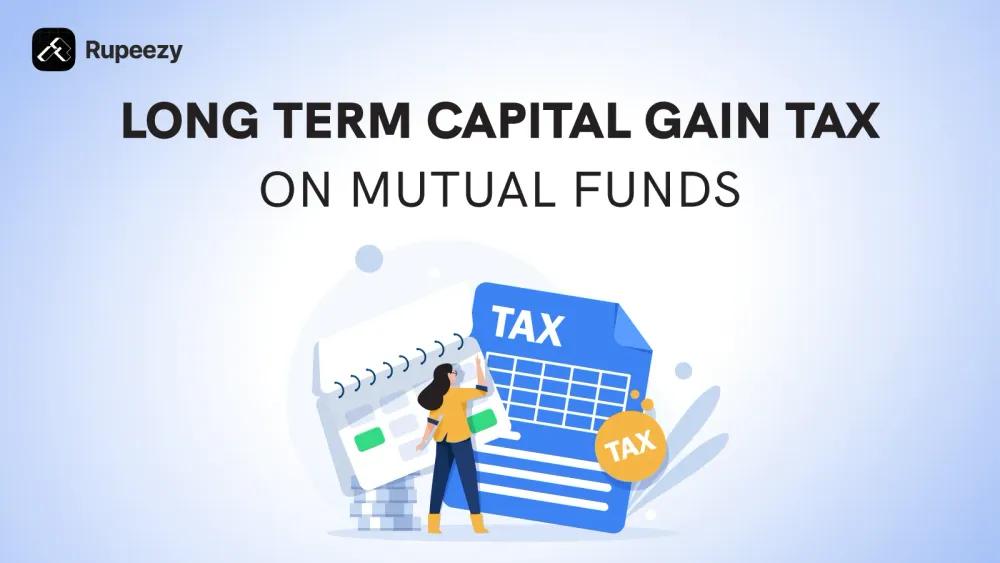LTCG on Mutual Funds (Long Term Capital Gain Tax)


00:00 / 00:00
Mutual funds are popular among investors as they are convenient, simple to understand and invest in and tax efficient as well. If you hold a mutual fund for long term, the profits gained in certain categories of funds are not taxed at your tax slab rates but get preferential tax rates. In this article, we will discuss taxation of long term capital gains on mutual funds.
What is LTCG in Mutual Funds?
Capital gain, in simple terms, is the profit you make when you sell your mutual funds units.
Suppose, you bought 100 units of a scheme at Rs. 50 NAV in 2020.
Today the NAV of the fund is Rs 75.
Your profit or capital gain= 75*100 - 50*100 = 75000-50000 = Rs. 25000
This is known as capital gain.
For tax purposes, there are two types of capital gains defined as per the holding period of units.
Long Term Capital Gain
Short Term Capital Gain
The holding period defines the type of capital gain, but for different types of mutual funds, the holding period differs for capital gains.
Equity Funds:
When equity mutual fund units are held over 12 months, the capital gains on sale of such units are termed as Long Term Capital Gains (LTCG). The tax is applicable in the year when units are actually sold and capital gain is realised, it is not payable unless holdings are redeemed.
Any capital gains accrued when mutual fund holdings are sold within one year of purchase are termed as Short Term Capital Gains (STCG).
Debt Funds:
Prior to Budget 2024 changes, capital gains from debt mutual fund units held over 36 months was defined as long term capital gain.
Post Budget 2024, there is only short term capital gains applicable for debt mutual funds.
LTCG Tax on Different Mutual Funds
LTCG On Equity Mutual Funds
Equity funds or equity oriented funds with >65% corpus invested in equity, the capital gains are taxed as under:
Units sold on or after 23 July, 2024
For equity and equity oriented mutual fund units held for more than 12 months, long term capital gains tax rate is 12.5%.
There is no LTCG tax applicable on capital gains up to Rs 1,25,000 in a financial year. Any amount over Rs1,25,000 is liable for LTCG tax.
For units sold within 12 months of purchase, Short Term Capital Gains (STCG) Tax has been revised to 20% (from erstwhile 15%).
Units sold before 23 July, 2024
For units held over 12 months LTCG tax of 10% is applicable (old LTCG tax rate).
STCG for units sold within 12 months of purchase will be taxed at 15%
Equity Funds | Holding Period | LTCG Tax | STCG Tax |
Units sold before 23 July 2024 | >12 months | 10% | 15% |
Units sold on or after 23 July 2024 | >12 months | 12.5% | 20% |
LTCG On Debt Mutual Funds
For debt funds or debt oriented schemes with >65% corpus invested in debt securities, the capital gains holding period and tax rate are not the same as equity schemes. The capital gains tax is for debt funds is as under:
Units purchased after 1 April, 2023
If you invested in debt funds after 1 April 2023, new capital gains tax rule announced in Union Budget 2024 applies.
There is no separate tax rate for different holding periods on debt funds. Any capital gain from debt schemes is added to income and taxed as per investor’s income tax slab rate.
Units purchased before 1 April, 2023
If you invested in debt funds before 1 April 2023, there are two scenarios:
Units sold before 23 July, 2024
Units purchased before 1 April 2023 and sold before 23 July 2024 are taxed as per previous capital gains tax rule.
Units held more than 36 months qualify for LTCG tax of 20% with indexation benefit.
Indexation benefit accounts for inflation and brings overall tax liability lower.
Units sold on or after 23 July, 2024
Units bought before 1 April 2023 but sold on or after 23 July 2024, after a holding period of 24 months, qualify for LTCG, and taxed at 12.5%.
Gains from units held for less than 24 months are added to income and taxed as per income tax slab rate.
Debt/Debt Oriented Funds | Holding Period | LTCG Tax | STCG Tax |
Units bought before 1 April 2023 | |||
Sold before 23 July 2024 | >36 months | 20% + indexation benefit | Income tax slab rate |
Sold on or after 23 July 2024 | >24 months | 12.5% | Income tax slab rate |
Units bought after 1 April 2023, sold anytime | Always short term | Income tax slab rate | Income tax slab rate |
LTCG On Hybrid Mutual Funds
For tax purposes, hybrid funds that hold >35% but <65% equity have a different tax structure compared to equity or debt funds.
Units sold before 23 July, 2024
Units held for more than 36 months are liable for LTCG tax of 20% with indexation benefit.
STCG is added to income and taxed as per income tax slab rate.
Units sold on or after 23 July, 2024
Units held for more than 24 months are liable for LTCG tax of 12.5%
STCG is added to income and taxed as per income tax slab rate.
Hybrid Fund >35% <65% in equity | Holding Period | LTCG Tax | STCG Tax |
Units sold before 23 July 2024 | >36 months | 20% with indexation benefit | Income tax slab rate |
Units sold on or after 23 July 2024 | >24 months | 12.5% | Income tax slab rate |
LTCG On Other Mutual Funds (Gold, Silver, International)
There are categories of mutual funds that do not invest in equity or debt but other asset classes such as gold, silver, international funds, international fund of funds etc. These are taxed as under:
Units purchased before 1 April, 2023
Units sold before 23 July, 2024
Capital gains on units held over 36 months are liable for LTCG tax of 20% with indexation benefit.
Units are sold on or after 23 July, 2024
Capital gains on units held over 24 months are liable for LTCG tax of 12.5%.
STCG is taxed as per income tax slab rate.
Units purchased after 1 April, 2023
Units sold before 1 April, 2025
Any capital gain is added to income and taxed as per slab rate.
Units sold after 1 April, 2025
Capital gains on units held over 24 months are liable for LTCG tax of 12.5%.
STCG is taxed as per slab rate.
Other Funds (Gold, Silver, iInternational,Int. FOF etc.) | Holding Period | LTCG Tax | STCG Tax |
Units purchased before 1 April 2023 | |||
Units sold before 23 July 2024 | >36 months | 20% with indexation benefit | Income tax slab rate |
Units sold on or after 23 July 2024 | >24 months | 12.5% | Income tax slab rate |
Units purchased after 1 April 2023 | |||
Units sold before 1 April 2025 | Income tax slab rate | Income tax slab rate | |
Units sold after 1 April 2025 | >24 months | 12.5% | Income tax slab rate |
How to Save LTCG on Mutual Funds
You can save long term capital gain tax on mutual funds with conscious investment planning and a few simple ways:
1. Yearly LTCG Tax Exemption Limit
Union Budget 2024 increased the annual LTCG exemption limit from Rs. 1,00,000 to Rs. 1,25,000. This means that capital gain on mutual funds up to Rs 1,25,000 in a financial year does not attract any LTCG tax. Any amount above this limit is liable for LTCG tax. You can keep this limit in mind while booking profits and enjoy nil LTCG tax every year.
In case of debt funds purchased before 1 April 2023, if you hold your debt fund for more than 36 months, you are liable to pay LTCG tax of 20% with indexation benefit. However, for funds bought after 1 April 2023, any capital gain from debt funds is added to income and taxed as per slab rate.
2. Systematic Withdrawal Plan (SWP)
Systematic withdrawal plan in mutual funds is a facility to redeem a predefined amount periodically and consistently book profits and earn regular income from your mutual fund holdings. SWP also ensures you can set a limit to keep your profit booking within LTCG tax exemption of Rs 1,25,000 every financial year.
3. ELSS Funds
You can explore ELSS (Equity Linked Saving Scheme) funds that are eligible for tax exemption under Section 80C up to a limit of Rs 1,50,000. ELSS funds invest in stocks and the fund has a lock-in period of 3 years.
You can structure ELSS investment in a way that capital gains are within the exemption limit. ELSS funds also ensure your money is invested long enough for growth, long-term gains and tax saving.
4. Tax Loss Harvesting
You can offset capital losses in a financial year against long term capital gains. Any unutilised loss can also be carried forward to the next eight financial years. However, it is not advisable to book losses just to offset capital gains.
5. Individual exemption limits
You can also minimise long term capital gains tax by investing in each family member’s name and thus utilising exemption limit of Rs 1,25,000 for each.
6. Minimise churn
A simpler way to reduce tax liability on mutual funds is to choose funds wisely in line with your financial goals and invest for the long term instead of switching between funds frequently and incurring capital gains tax multiple times.
How to Avoid LTCG Tax on Mutual Funds Legally
You can avoid LTCG tax on mutual funds by taking a holistic view of your finances, chalk out a financial plan, enlist various goals, assess your risk appetite and invest in suitable mutual funds.
It is advisable to assess mutual fund schemes on their long term performance, risk taken, expense ratio, size of the fund, fund manager and AMC’s track record and fund objective. A carefully selected portfolio maintained over a long term allows fund managers required time to implement investment strategies, tide over short term fluctuations and deliver capital appreciation.
Therefore, taking a long-term view is best not only for wealth creation but also minimise capital gains tax.
Impact of LTCG on Mutual Funds Returns
The final return you earn from a mutual fund depends on factors such as overall market performance, fund strategy, stock-specific movements, expense ratio, and taxes.
Capital gains tax slices away a portion of your profit by way of fixed tax liability in the year you book profits. The quantum of capital gains tax can be high as your income tax slab rate on debt funds to 12.5% LTCG tax on equity funds on the lower end.
It is essential to get acquainted with capital gains tax provisions and changes to manage tax efficiently and utilise exemptions available to keep your tax liability to the minimum.
Conclusion
Union Budget 2024 introduced changes in Long Term Capital Gains tax provisions. On a plus side, the LTCG tax is applicable only on capital gains above Rs 1,25,000 per financial year. On the flip side, the LTCG tax rate has been increased to 12.5% from 10%. Debt funds purchased after 1 April 2023, any capital gain is taxed at income tax slab rate.
Discover the best ELSS, equity, debt funds with Rupeezy. Mix and match, test portfolio mixes, compare and assess funds on risk-return graph, check portfolio overlap, select funds with smart data analytics in a few clicks.
Simple & smart mutual fund investing, only with Rupeezy.
FAQs
Q. How to calculate LTCG on mutual funds?
You can deduct the sale price from purchase price to arrive at capital gains amount. The period of time between purchase date and sale date decides if the capital gains is long term or short term, e.g. for equity funds, redemption a holding period of 12 months and above is defined as long term capital gain.
Q. Is LTCG exempt upto 1 lakh?
As per Union Budget 2024 announcement, LTCG on equity funds up to Rs 1,25,000 in a financial year is exempt from LTCG tax.
Q. How much gains are exempted in LTCG of mutual funds?
Long term capital gain on equity funds up to Rs 1,25,000 in a financial year is exempt from LTCG tax.
Q. How do I check my capital gains on mutual funds?
You can generate your capital gains statement from the platform you invest through or directly visit a mutual fund’s website or CAMS website to download capital gains statement.
Q. Is LTCG applicable on SIP investments?
Yes, LTCG is applicable on SIPs as well. LTCG is applicable to any profit you earn by selling units of mutual funds. SIP is simply a mode of investment, the tax rules remain the same for SIP and lumpsum investments.
Check Out These Related Articles |
The content on this blog is for educational purposes only and should not be considered investment advice. While we strive for accuracy, some information may contain errors or delays in updates.
Mentions of stocks or investment products are solely for informational purposes and do not constitute recommendations. Investors should conduct their own research before making any decisions.
Investing in financial markets are subject to market risks, and past performance does not guarantee future results. It is advisable to consult a qualified financial professional, review official documents, and verify information independently before making investment decisions.

All Category









